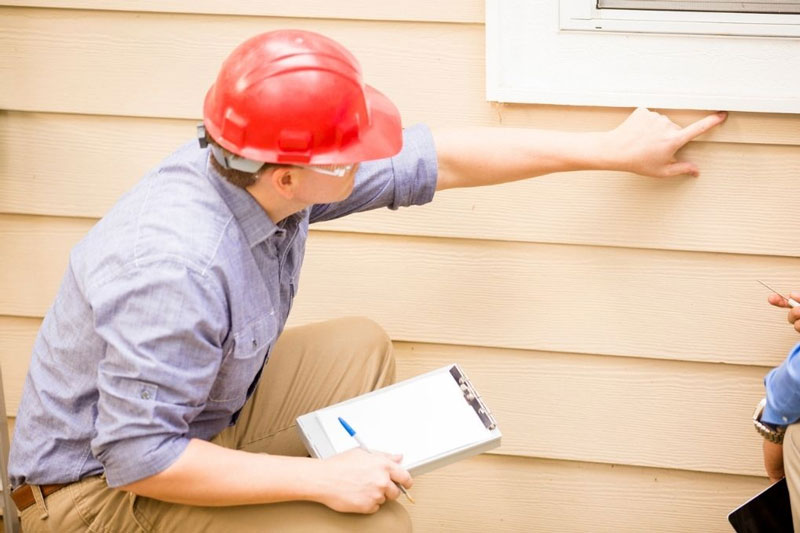Discuss Why You Should Get a Home Inspection?
Nov 14, 2023 By Susan Kelly
It's possible to look for a new house that you will feel like a whirlwind of open houses, community walks, and online listings. There is a great deal to take into account! You would like a property in the ideal area within your price range with an amazing kitchen and a wonderful yard.
Then, when everything falls into place, you begin to believe that you've located your ideal residence. But don't sign anything "under agreement" just yet! First, ensure that your contract has a clause allowing an inspection to be terminated if necessary. In the long run, acting in this manner may help you avoid many headaches and money that have been set aside.
Once you have agreed to purchase a house, you must undergo a formal inspection performed on the property by either a licensed engineer or a qualified inspector. The home inspector will meticulously evaluate the entirety of the house, beginning at the roof and working his way down to the foundation, looking for any signs of operational issues with the property's systems, structure, and appliances. A house inspection may cost a few dollars upfront, but it might save you a thousand bucks. Get as much information as possible about the apartment's state when you take ownership.
What Does a Home Inspection Entail?

When a house is sold, a home inspector goes over it and writes up an assessment of its condition. A professional home inspector will look at the estate's air conditioning and heating systems, drainage, construction wiring, plumbing, sanitation, and some security and fire hazards. The house inspector will also search for signs of termites, water leaks, risk of fire, and any other problems that might reduce the homeowner's worth.
Process of a Home Inspection

Many people considering purchasing a house engage inspectors to investigate the property and provide them with a formal statement on its state, along with an evaluation of any renovations, upkeep, or other problems that could arise and add high costs to the purchase. The property inspector's job is to examine every part of the house, from the basement to the attic to the electrical and plumbing. The results of this inspection will establish the apartment's compliance with building regulations.
Here are some instances of why you shouldn't skip the house inspection and what are the home inspection benefits:
It Gives You a Way Out
Trained inspectors thorough examination of a house and its components might disclose important details regarding their state of repair. This helps the owner plan for and prepare for any necessary expenditures, repairs, and upkeep in the short and long terms. In most cases, the home inspection is the final chance for a customer to pull out of a purchase agreement before closing.
Protection
All potential health risks that may be identified during a home inspection. These are the three contaminants that every house needs to be checked for. Make it a point to check that the agreement you sign to buy a property includes a clause stating that if any of these dangers are found, you get the right to back out of the deal and get your money back.
Disclosing Unauthorized Alterations
A home inspection can disclose how many rooms were added, whether the porch was renovated, or whether the underground was finished without a permit or violated building codes. "Room expansions that the local building department did not approve can hurt a home's insurance, taxation, accessibility, and total cost. A customer is essentially investing in something that does not technically exist, "The author explains. Even brand-new homes with non-compliant installations of equipment will be the "issue" of the next proprietors.
Assurance of safety
Buying a repossessed or short-sale property makes a home evaluation even more important. A common issue with boarded-up homes is the growth of toxic mold, which can spread quickly, cause respiratory issues, and cost a lot to fix. People often remove metal plumbing lines and exterior appliances from abandoned residences to make a buck.
Estimate Upcoming Expenses
A home inspector can estimate the age at which important systems in the home, such as drainage, heating systems, cooling systems, and essential equipment, such as water heaters, were installed. They can make a diagnosis regarding the present state of the building itself and provide information regarding the age of the home's furnishings.
Every element in the house has a predetermined amount of time that it may be used. Knowing when they need to be replaced may assist you in making critical decisions regarding your finances, and it can also help you figure out what kind of house healthcare insurance or certifications you must look into purchasing for your property.
Identify the Obstacles
One of the main reasons for not skipping a home inspection is that it might assist a buyer in determining how much more time and financial resources they are prepared to put in to get the house into a satisfactory condition. Do not call it quits on the hunt for a new house just yet if you are not prepared to fix things like leaky gutters, crumbling walls, and sagging ceilings.
How to Safeguard Your Investment?
The home inspection office is a key instructional resource for the homeowner. They can provide precise advice on preserving the home, which may eventually spare you a lot of money over the long run.
Bargaining Tool
Buyers can negotiate with sellers over repair costs and potential price concessions using the results of a house inspection. Consult your agent to learn the appropriate requests to make during negotiations.
Conclusion
You must learn as much as possible about the residence that you are going to own in the coming time. You can better analyze the importance of home Inspection because it provides a clear picture of the internal dynamics of the place and allows you to learn about all of the benefits and potential drawbacks that the home in question has to offer.

Know-how
Navigating Personal Finances: What to Do When a Loved One Owes You Money
Navigate when a loved one owes you money: Open communication, crafting agreements - Strategies for resolving finances, preserving relationships.
Learn More
Taxes
Relocating Costs: What Is Form 3903?
The 2017 Tax Cuts and Jobs Act modified the criteria for taking a tax deduction for relocation costs. Deducting relocation costs on your federal tax return is no longer possible. This modification will be in effect during the upcoming tax years (2018-2025). However, you may be eligible for a deduction if you serve in the active military and fulfill specific requirements or if you need to amend a past return before tax reform.
Learn More
Investment
Unlocking Real Estate Investment: A Comprehensive Guide to ArborCrowd
Explore ArborCrowd, a pioneering crowdfunding platform revolutionizing real estate investment, offering diverse opportunities.
Learn More
Know-how
What is Homeowner’s Insurance?
Owing a home can be costly. As the value of the property increases, the cost to make repairs to the house also increases, which affects the insurance premium.
Learn More
Know-how
Is Monarch Money Worth It? An In-Depth Analysis for 2024
Discover how Monarch Money simplifies personal finance management with its user-friendly interface, comprehensive features, and educational resources for effective budgeting and goal tracking.
Learn More
Investment
Solving Stock Symbols: Guide to Ticker Symbol Significance
Companies with similar names are also distinguished by stock symbols. Citigroup and Citizens Financial Group, trading under 'C' and 'CFG' on the NYSE, are different corporations but share names. Read more.
Learn More